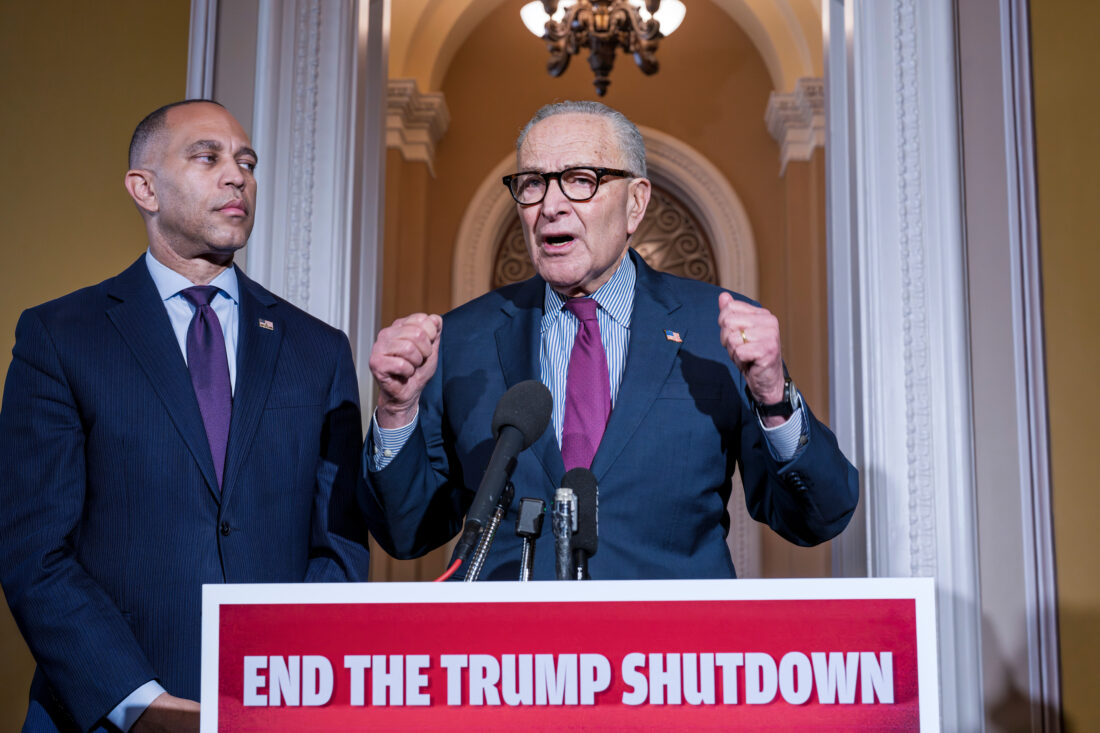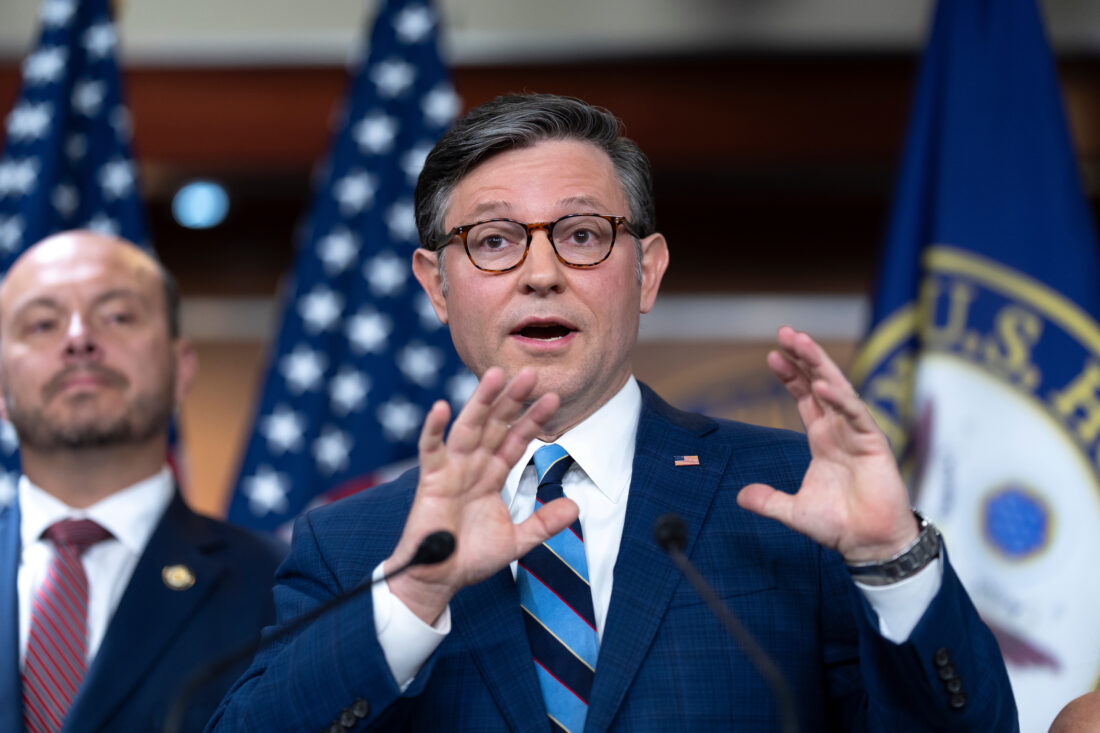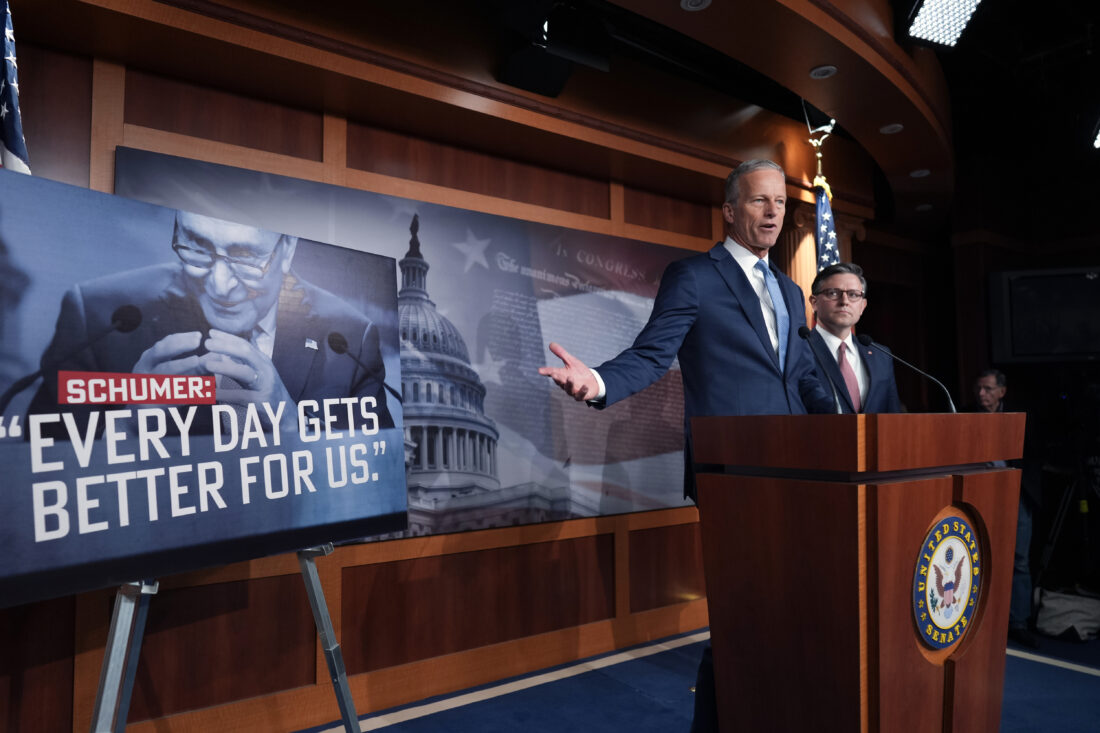Democrats say Trump needs to be involved in shutdown talks. He’s shown little interest in doing so

House Minority Leader Hakeem Jeffries, D-N.Y., left, and Senate Minority Leader Chuck Schumer, D-N.Y., speak to reporters outside the Senate chamber as they charge President Donald Trump and the Republicans with the government shutdown, at the Capitol in Washington, Thursday, Oct. 16, 2025. (AP Photo/J. Scott Applewhite)
WASHINGTON (AP) — President Donald Trump is showing little urgency to broker a compromise that would end the government shutdown, even as Democrats insist no breakthrough is possible without his direct involvement.
Three weeks in, Congress is at a standstill. The House hasn’t been in session for a month, and senators left Washington on Thursday frustrated by the lack of progress. Republican leaders are refusing to negotiate until a short-term funding bill to reopen the government is passed, while Democrats say they won’t agree without guarantees on extending health insurance subsidies.
For now, Trump appears content to stay on the sidelines.
He spent the week celebrating an Israel-Hamas ceasefire deal he led, hosted a remembrance event for conservative activist Charlie Kirk and refocused attention on the Russia-Ukraine war. Meanwhile, his administration has been managing the shutdown in unconventional ways, continuing to pay the troops while laying off other federal employees.
Asked Thursday whether he was willing to deploy his dealmaking background on the shutdown, Trump seemed uninterested.

Speaker of the House Mike Johnson, R-La., joined at left by Rep. Andrew Garbarino, R-N.Y., gestures as he answers questions during a press conference on day 16 of the government shutdown, at the Capitol in Washington, Thursday, Oct. 16, 2025. (AP Photo/J. Scott Applewhite)
“Well, look, I mean, all we want to do is just extend. We don’t want anything, we just want to extend, live with the deal they had,” he said in an exchange with reporters in the Oval Office. Later Thursday, he criticized Democratic health care demands as “crazy,” adding, “We’re just not going to do it.”
Spokesperson Karoline Leavitt told Fox News that Democrats must first vote to reopen the government, “then we can have serious conversations about health care.”
Senate Majority Leader John Thune echoed that approach before leaving for the weekend, saying Trump is “ready to weigh in and sit down with the Democrats or whomever, once the government opens up.”
Still, frustration is starting to surface even within Trump’s own party, where lawmakers acknowledge little happens in Congress without his direction.
Leaving the Capitol on Thursday, GOP Sen. Lisa Murkowski said, “We’re not making much headway this week.” For things to progress, Murkowski acknowledged Trump may need to get more involved: “I think he’s an important part of it.”

Senate Majority Leader John Thune, R-S.D., left, and Speaker of the House Mike Johnson, R-La., speak at a news conference as the government shutdown begins its tenth day, in Washington, Friday, Oct. 10, 2025. (AP Photo/J. Scott Applewhite)
“I think there are some folks in his administration that are kind of liking the fact that Congress really has no role right now,” she added. “I don’t like that. I don’t like that at all.”
Trump has not been slowed by the shutdown
While Congress has been paralyzed by the shutdown, Trump has moved rapidly to enact his vision of the federal government.
He has called budget chief Russ Vought the “grim reaper,” and Vought has taken the opportunity to withhold billions of dollars for infrastructure projects and lay off thousands of federal workers, signaling that workforce reductions could become even more drastic.
At the same time, the administration has acted unilaterally to fund Trump’s priorities, including paying the military this week, easing pressure on what could have been one of the main deadlines to end the shutdown.
Some of these moves, particularly the layoffs and funding shifts, have been criticized as illegal and are facing court challenges. A federal judge on Wednesday temporarily blocked the administration from firing workers during the shutdown, ruling that the cuts appeared politically motivated and were carried out without sufficient justification.
And with Congress focused on the funding fight, lawmakers have had little time to debate other issues.
In the House, Johnson has said the House won’t return until Democrats approve the funding bill and has refused to swear in Rep.-elect Adelita Grijalva. Democrats say the move is to prevent her from becoming the 218th signature on a discharge petition aimed at forcing a vote on releasing documents related to the sex trafficking investigation into Jeffrey Epstein.
So far, the shutdown has shown little impact on public opinion.
An AP-NORC poll released Thursday found that 3 in 10 U.S. adults have a “somewhat” or “very” favorable view of the Democratic Party, similar to an AP-NORC poll from September. Four in 10 have a “somewhat” or “very” favorable view of the Republican Party, largely unchanged from last month.
Democrats want Trump at the table. Republicans would rather he stay out
Senate Minority Leader Chuck Schumer and House Democratic Leader Hakeem Jeffries have said Republicans have shown little seriousness in negotiating an end to the shutdown.
“Leader Thune has not come to me with any proposal at this point,” Schumer said Thursday.
Frustrated with congressional leaders, Democrats are increasingly looking to Trump.
At a CNN town hall Wednesday night featuring Rep. Alexandria Ocasio-Cortez and Sen. Bernie Sanders, both repeatedly called for the president’s involvement when asked why negotiations had stalled.
“President Trump is not talking. That is the problem,” Sanders said.
Ocasio-Cortez added that Trump should more regularly “be having congressional leaders in the White House.”
Democrats’ focus on Trump reflects both his leadership style — which allows little to happen in Congress without his approval — and the reality that any funding bill needs the president’s signature to become law.
This time, however, Republican leaders who control the House and Senate are resisting any push for Trump to intervene.
“You can’t negotiate when somebody’s got a hostage,” said South Dakota Sen. Mike Rounds, who added that Trump getting involved would allow Democrats to try the same tactic in future legislative fights.
Trump has largely followed that guidance. After previously saying he would be open to negotiating with Democrats on health insurance subsidies, he walked it back after Republican leaders suggested he misspoke.
And that’s unlikely to change for now. Trump has no plans to personally intervene to broker a deal with Democrats, according to a senior White House official granted anonymity to discuss private conversations. The official added that the only stopgap funding bill that Democrats can expect is the one already on the table.
“The President is happy to have a conversation about health care policy, but he will not do so while the Democrats are holding the American people hostage,” White House spokesperson Abigail Jackson said Thursday.
A product of the Congress Trump has molded
In his second term, Trump has taken a top-down approach, leaving little in Congress to move without his approval.
“What’s obvious to me is that Mike Johnson and John Thune don’t do much without Donald Trump telling them what to do,” said Democratic Sen. Mark Kelly of Arizona.
His hold is particularly strong in the GOP-led House, where Speaker Mike Johnson effectivelyowes his job to Trump, and relies on his influence to power through difficult legislative fights.
When Republicans have withheld votes on Trump’s priorities in Congress, he’s called them on the phone or summoned them to his office to directly sway them. When that doesn’t work, he has vowed to unseat them in the next election. It’s led many Democrats to believe the only path to an agreement runs through the White House and not through the speaker’s office.
Democrats also want assurances from the White House that they won’t backtrack on an agreement. The White House earlier this year cut out the legislative branch entirely with a $4.9 billion cut to foreign aid in August through a legally dubious process known as a “pocket rescission.” And before he even took office late last year, Trump and ally Elon Musk blew up a bipartisan funding agreement that both parties had negotiated.
“I think we need to see ink on paper. I think we need to see legislation. I think we need to see votes,” said Ocasio-Cortez. “I don’t accept pinky promises. That’s not the business that I’m in.”
Both parties also see little reason to fold under public pressure, believing they are winning the messaging battle.
“Everybody thinks they’re winning,” Murkowski said. “Nobody is winning when everybody’s losing. And that’s what’s happening right now. The American public is losing.”

